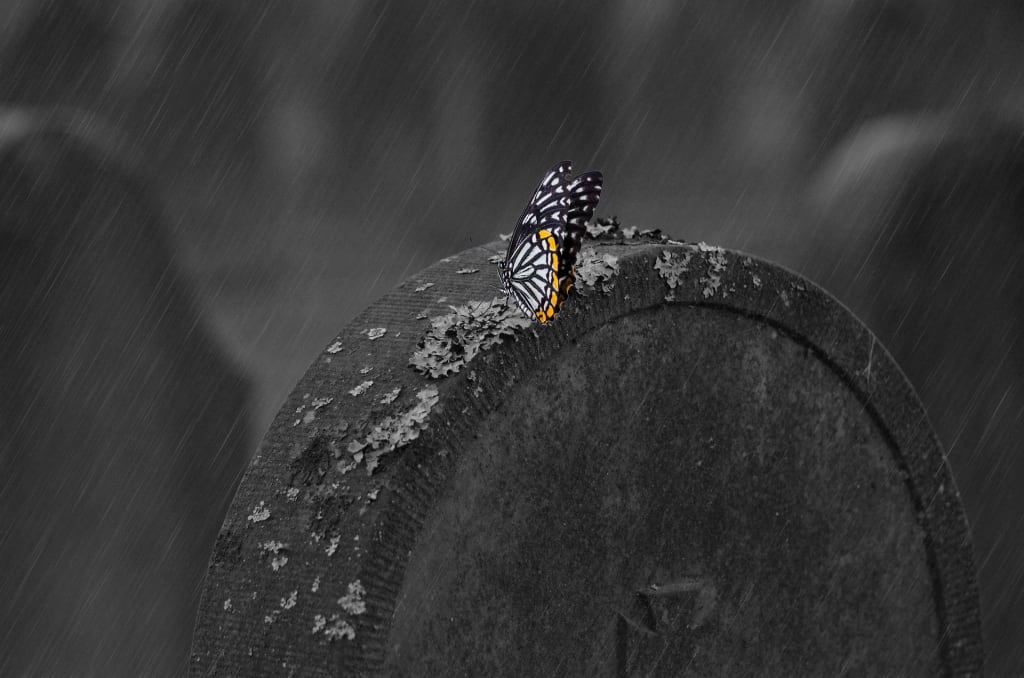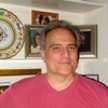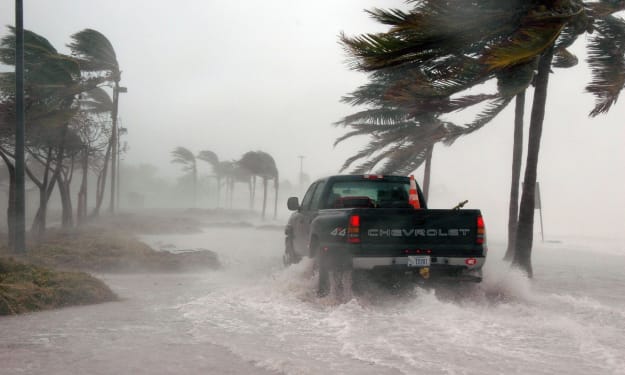
I didn’t cry at my father’s funeral. And that fact haunted me for years.
I sat quietly to one side as scores of relatives, friends, and colleagues streamed into the funeral parlor. Waited their turns. Shed their tears. Said their goodbyes and gracefully exited, never to be seen again.
At thirteen, I was two inches shy of six feet. I looked like a man. Was treated like one at times too. But on the inside, I was just a little boy who had watched his father die in a restaurant parking lot on a Saturday night. Watched an off-duty fireman applying CPR, while my mother prayed and cried and waited for God to please step in and save him.
He never did.
I didn’t blame him as my father was packed into the back of an ambulance. Didn’t think of God or religion or anything really, except myself and the emptiness that was growing inside.
I had been walking with my one-year-old sister for over an hour while everyone tried to bring back a man who the doctors would later tell us, was dead as soon as he hit the asphalt.
I felt the loss deeply, sure. Objectively I was being torn apart into neat little pieces. But subjectively, in a place where emotions and reality met and exchanged glances and tried to figure out what the hell was going on, I could not associate anything I felt with him being gone, because, for me, he had been gone long before he died.
My father was a man of his day. Quiet. Impatient at times. Focused on work and friends and that part of the world that was off-limits to me and when he joined us, my sisters, and me in our world, he was an outsider.
Aloof but not indifferent. Kind but hesitant to reveal that side of himself, as if it would somehow ruin the surprise that he was waiting to spring on us. He had a gentleness about him that drew me in. Made me want to sit next to him. Hold his hand. Touch his face. But all these things made him feel awkward.
He never pushed me away. He simply made a point of never letting me in.
So, when the light faded from his eyes. When I didn’t see him sleeping next to my mom that first night. When I awoke the next morning to strangers in the house, creeping with practiced sorrow up and down the stairs, I knew that whatever I had remembered from the day before was real.
There was no dream to awaken from. No fall that left me woozy and afraid. He was dead.
And I was angry. At him and at myself. Angry because I was now weighted down with questions that would never be answered. Held them inside of me waiting for the perfect time, and now, that too would never come.
Death was new to me in 1966. Real death. Not the Hollywood kind you’d see on TV and in the movies. Men falling off horses. Soldiers slumping to the ground never to rise again. They were real enough.
But there was no residue from those scenes. Nothing that lingered for hours or days. Reminding you that nothing lasted forever as you quietly ate your Capt. Crunch cereal for breakfast.
I had been to cemeteries before. The final resting place once the viewing was over, the flowers taken away and the last car pulled out of the parking lot.
I liked cemeteries. Found them peaceful. A quiet oasis carved out of a city where only the dead were allowed and those who mourned for them. I seemed to fit right in. Walking along the grass-covered lanes. Reading the gravestones. Doing the math to see how old the occupants were when they died.
Not morbid curiosity, I just wanted to know. I wanted some insight into the process of life and death. If I saw too many that died young, I’d worry. The stats were not in my favor. But the next time the average age would rise, the odds improved and I felt alright again.
Not something most children think about, I give you that. But then, I was not like most children.
Hard to pinpoint how I was different. Most could tell from looking at me that I was unusual. Being bigger and taller than my father at twelve. But that was only part of the story. Like the iceberg, the nine-tenths that wasn’t visible made all the difference.
I loved to laugh as a child - but often didn’t. Nothing wrong with my sense of humor, just something wrong with the wiring. I could tell easily enough when something was funny. It’s just the other stuff got in the way.
The sadness, though not mine at first, but soon became mine over the years. Watching the elderly walk slowly down the block. Eyes focused on the sidewalk, looking for cracks or holes that might make them fall and break a hip.
The parents who worked and streamed out of the 20th Avenue subway station at the end of the day; me watching and taking notes. Tired steps. Weary eyes. Newspapers tucked under their arms as they strode purposefully out of the building. Their steps got lighter the closer they got to home.
Watching my aunt and uncle who lived in the same house and the older cousins already with jobs. With families started. With eyes not as bright as they once were.
Every fucking detail I saw. Every laugh that was cut short. Every slump in their shoulders. Their forks paused over their dinner plates - eyes distant, attention far away. The conversations that dwindled. The angry days that grew in number. The raised voices. The worries about rent and the kid’s braces.
I wanted to laugh. Even at the funeral home. Couldn’t help it. The talking. The whispering. The crying and heaving shoulders. Their own laughter outside as they smoked cigarettes and talked about the Yankees and their chances for the pennant.
About work and another kid being on the way - not planned for Chrissakes.
They mentioned, Rocky, my father, and what a good guy he was. Hadn’t seen him enough. Didn’t know he was sick. His heart just gave up, that’s what they heard.
His heart did give up. Outside Bronco Charlie’s restaurant. One beat it was pumping, all’s good, the next - it just shut down. Brain got the word; the next step didn’t happen. Momentum just sent him to the ground. One second, he’s fingering his keys, the next - dead.
The funeral was educational. An entire semester at some fancy private school crammed into three days and nights. Forty hours of watching and listening and recalibrating the grief I felt inside. Tuning it out when it threatened to overwhelm me.
Turning it up when I felt that I wasn’t being solemn enough. When grownups stared at me because I smiled. Believing I was insincere. That I wasn’t suffering the death of my father in measures equal to their own.
Not true, I was just coping. I smiled because I remembered his laughter. I remembered the day at the 1964 World’s Fair in Flushing Meadow. The food, the science, the neatly tailored jacket he wore. That he always looked nice and I seldom did - and I was his son.
I laughed for the same reason one releases the pressure on a boiler when he sees that little dancing needle getting too close to the red.
It was a coping mechanism as I would learn years later.
A means of dealing with the loss; the trauma formed from hearing over and over again - that my father was dead. That he would rest in peace now. That his heart would no longer bother him. That all was good and we would be alright. He was with God now.
Well, it wasn’t fucking alright. There was no joy in his passing. There was no closure, or whatever it was I was supposed to be feeling. Only a vague notion that something good that could’ve been, now never would be.
I appreciated their efforts though, I really did. I knew they meant well. I knew they struggled with finding the right words to help me and ended many sentences prematurely with a nod as they walked away.
I knew all these things and a great deal more because I had spent the first thirteen years of my life watching and observing everything people did and otherwise laying waste to a childhood that was supposed to be mine to enjoy.
Only I didn’t. Couldn’t. I had been pulled into the slipstream of bad news from an early age. Hearing too often about wars. Seeing too often, unsettling images on television about the civil rights movements. The poor treatment of blacks in our country. The poverty. The economy. Nixon versus Kennedy. Then the latter’s death.
The nation mourning for him. I mourned for him too. Though no one thought to ask me or anyone else my age - how do you feel?
We were children. We weren’t fully formed yet. As if that meant we didn’t feel things like pain and loss. Be thankful your brains don’t yet understand these things. They will soon enough.
Right. So, what were those ideas and images stuck inside my head, make-believe?
****
My father was born in 1916. His mother was barely 20 before he lost her to the Spanish Flu. Along with so many others who left behind a legacy of pain and abandonment.
I know he suffered because of this. I know it formed who he became. And that there was something in her that she passed along to her son. A gentleness of spirit. Something he held onto for as long as he could.
Though in the end, I’m not sure it was there anymore. The losses, the years, and the plans that never came to be had slowly eroded the part of him that I loved.
****
I was five when I learned to ride a bike. A small two-wheeler my father had gotten from somewhere. New or used, it didn’t matter. It was there and it was mine.
I watched him attach the training wheels to the back tire. Quickly and easily as he did most things. He always seemed to know exactly what to do when something was broken. I marveled at how much information was inside his head. How he looked at a problem. Figured out what was needed. Got the right tool.
I was never very good at fixing things. The gene skipped a generation, I guess. I could usually see what was wrong. I could imagine myself fixing it. I could imagine all sorts of things going wrong though and me ending up with something that no longer worked and parts everywhere. With someone frowning and looking distressed.
But the world outside of him seemed a safer place. Things were easy. People weren’t. With a new screw, a straight nail, and the problem was solved. But inside. Where my father’s history dwelled unvisited by me, was a complex and troubling place.
He looked up at me when it was done and smiled. He had a broad pleasing smile filled with a quality I could never quite put my finger on. Maybe it was love or satisfaction or just a little of the real Rocco slipping through for the world to see.
But I liked it, especially when it was directed at me. Lit me up like a Christmas tree. My dad, my world, together.
He ran behind me at first, holding the seat and shouting, “Peddle faster Joey, peddle faster or you’ll fall.” But he let go too soon before I was ready. Couldn’t keep up. His wind not there. The cigarette cough coming on as his heart beat fast, probably faster than it should have.
He leaned onto his knees head down and watched as I rode headlong into a neighbor’s bushes. Stunned at first but unhurt, I started laughing. He shook his head. “Let’s try again.”
It’s funny how death loosens the tongue. How the mourners’ long-held inhibitions are released and narratives from the past move forward in time and are revealed easily enough.
They all created an image of a man that I didn’t recognize. A happy man. A man who laughed and made others laugh. Who liked a drink, a game of cards, and an evening out dancing and showing a side of himself I would have loved to have seen.
Who was eloquent in mixed company. Who told a good story. Who knew history and words and wove them together well enough so that all those years later, these friends still remembered them.
I listened to all of it. Soaked in not just the words but their emotions. Their faraway looks. The tears they quickly wiped away. The bits of sorrow that belonged only to him and were not a part of the stream of loss we all experience in life.
I knew Rocco as my father. The grey-haired man aged well beyond his years who walked through life with an anxious expression, forever glancing over his shoulder as if something wicked was coming up quickly from behind.
Who never raised his voice to me in anger. Worked hard and made beautiful things as a silversmith in New York City. Had many friends who loved him and yet took on his role as a parent with such a detached demeanor that I was forever fearful that his love was conditional. And might be gone at any moment.
They knew him as Rocky. An alter-ego who was unknown to me, who had romanced my mother. Danced with her during their courtship. Married her in 1949 and decided to start a family that from my limited perspective as his child, made me wonder why.
****
And then it was over. The last cigarettes were extinguished. The gift book was closed and handed to my mother. The remaining guests, those living closest to us, said their goodbyes along with promises to visit us soon.
Like a door slamming behind one as they enter a prison, I felt this part of my life ending. There was no more that could be done with it. Whatever happened. Whatever ideas or cool things I might like to share with him now - I couldn’t.
Whatever dreams and plans I had that he could have been a part of - were never going to happen.
I was young. I was immature in many ways. I still believed that anything was possible because life had not disabused me of that notion. So, in that one weekend several things had taken place.
I said goodbye to a father. I absorbed more sorrow and grief than I had the capacity to process and took my first few steps into the rest of my life. And I remained blissfully unaware of the trauma I had experienced and would have to deal with later in my life.
Hungry to understand the man who was no longer there, I was somehow self-aware enough to check that box and assure myself that though knowing more about him was not worth the death of someone I loved - at least I left that place with a better understanding of where I had come from.
About the Creator
Joe Luca
Writing is meant to be shared, so if you have a moment come visit, open a page and begin. Let me know what you like, what makes you laugh, what made you cry - just a little. And when you're done, tell a friend. Thanks and have a great day.
Reader insights
Outstanding
Excellent work. Looking forward to reading more!
Top insights
Compelling and original writing
Creative use of language & vocab
Heartfelt and relatable
The story invoked strong personal emotions






Comments (1)
Joe, your powerful memoir and crushing pain moved me more than my mere words will express. I felt and will remember this. ✍️